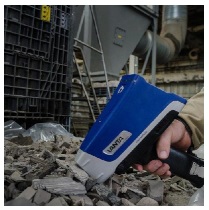TWO DECADES OF CHANGE IN THE CATALYTIC CONVERTER RECYCLING…
POSTED BY MAXIME LE BRETON
Since the turn of the century, much has changed in catalytic converter recycling. The industry has become increasingly complex, technology-based and professional.
Complexity has arisen from a combination of environmental issues that have led to legislation to limit toxic gas emissions, and from the relative prices of the Platinum Group Metals - platinum, palladium and rhodium - used in the catalyst process.
Vehicle manufacturers load catalytic converters with the most efficient combination of PGM’s to covert the toxic emissions to relatively harmless fumes. The different, and ever-changing, legislative requirements that are imposed in different countries and regions of the world, adds further complexity.
As well, the manufacturers will want to achieve this in the most cost-effective way, which is where the relative prices of the metals come into play. Until the early years of the 21st Century, platinum was the prime PGM used; however, as its price soared, palladium and rhodium became important, with the former now the key component. Going forward, palladium is now much more expensive than platinum, and manufacturers are known to be considering a switch back to the platinum, although this requires significant investment that makes the decision more difficult.
From the perspective of the scrap catalytic converter operator, it is important that, as 21st Century vehicles become increasingly available for dismantling, the market prices of all 3 PGM’s - and not just platinum - are followed to maximize profitability.
Further complexity is added as manufacturers seek improved fuel efficiency, through using lighter materials, smaller engines that burn less fuel and, perhaps the most important development in the near future, battery-powered vehicles.
Technology has played an important role in the development of the industry. The recycling of a catalytic converter is not a simple task, requiring as it does de-canning, milling, sampling, smelting and refining. In its early days, the market was vey much buyer-based with catalysts usually bought and sold on a per unit basis, and the seller lacking the detailed knowledge and technical ability to argue with the price offered. This changed, quite dramatically, with the advent of laboratory assaying, using X-Ray Florescence (XRF) analyzers that has led to greater accuracy and transparency in the buying and selling process. Furthermore, flexibility has been added, with smaller lots able to be processed, thus allowing better separation of different types of converter.
Professionalism is now a word we can happily and confidently use in the context of the industry. The sheer size and importance of the market has led to the main players investing in the new technologies and streamlining operations to meet the competitive challenges. The best recyclers now offer a combination of:
Simplified shipping solutions
Suppliers are required to do no more than fill their container and ship to the recycler, who will then undertake the full separating and processing operation.
Assaying and fast settlement
Once de-canned, ceramic is crushed and a sample taken for laboratory testing to determine the quantity of precious metals in each load. Final assayed results can be available within as little as 3 days along with the option of 100 percent payment upon hedge.
Full-service Processing
All-inclusive processing of auto catalysts (including foil, ceramic, DPF) and oxygen sensors
Small Lot Processing
Gone are the days of minimum weights of 2,000 pounds, when scrap collectors had to wait many months to sell their stocks of catalytic converters. Modern recyclers are able to offer accurate assaying and refining of as little as 200 pounds of material with fast settlement services.
Photo-grading and Catalogues
A number of forward-thinking companies have put together comprehensive catalogues that list upwards of 20,000 catalytic converter models. Some show prices in real time, so that potential sellers can see the immediate return. As well, many encourage suppliers to send in photos of their catalysts for assessment and pricing.
Education
Top recyclers understand that providing information and knowledge helps build a two-way relationship with their suppliers, encouraging transparency and honesty.
Hedging Flexibility
Hedging is a useful practice as a means of achieving protection in managing a portfolio - and, of course, the three PGMs that are recycled from scrap catalytic converters are, effectively, a portfolio of products that are exposed to price volatility in the metals market. Some recyclers will provide hedging services that allow sellers to defer receiving payment, if it is believed that the price for any one PGM is likely to rise in the future.
Shipping Help
With a wealth of knowledge and experience, professional processors are able to offer advice and provide the most economical shipping solutions as well as helping with automated documentation.
In conclusion, we believe that the changes we have seen over the past 20 years have benefited an industry that previously lacked transparency and professionalism.
As the market continues to grow, these positive changes will stand the industry in very good stead.

























